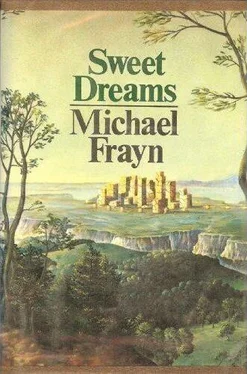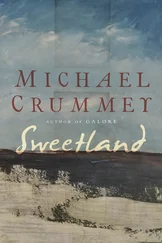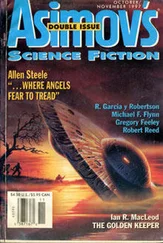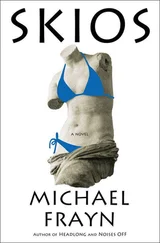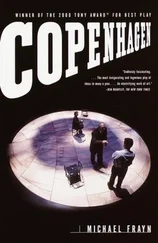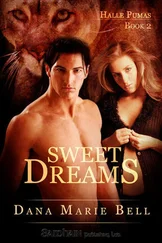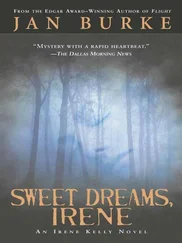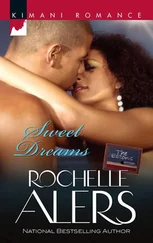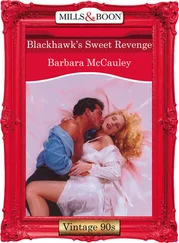Everyone round the table falls silent and looks at him, poised to laugh again.
“Why don’t we have coffee next door?” he says, and leads the way, amidst laughter and applause.
For he has realized something else, in the moment of inspiration between standing up and beginning to speak: that the aesthetic effect of honesty depends upon restraint in its application.
“Barratt was just telling us the other night at the Goodys’,” says Prue, as she pours coffee in the living-room, “about how he had lunch with God the other day.”
“Oh, really?” says Howard, intrigued.
“Do tell Howard about it,” Prue urges.
“There’s honestly nothing to tell,” says Barratt Kessel, embarrassed. “You make it sound as if there was just me. There were ten of us, altogether. I was sitting between the principal of a college for policewomen and a rather saucy lady novelist.”
“This was at the Palace?”
“Yes. It was just one of these regular lunch-parties he has so that he can keep in touch with people he wouldn’t otherwise meet. It wasn’t anything special.”
“I thought he didn’t in fact live in the Palace?” objects Francis Fairlie. “Someone in television told me he lived in an ordinary flat by the Park, with nothing but a secret-service man lurking in the lobby.”
“Oh, nonsense, Francis,” says Charles Aught. “He lives on the sixteenth floor of the RCA building. He’s got the whole floor. He gives terrible parties up there — I know a girl who’s been to them. All white sofas and Kokoschkas and rather smart young men who write rock shows.”
“Well, I don’t know,” says Barratt. “This lunch thing was at the Palace.”
They all wait for him to go on, while appearing as if they do not care whether he goes on or not.
“Well, go on,” says Howard. “What was he like?”
Barratt sighs.
“I know you’re all going to take the piss out of me if I tell you what I honestly thought.”
“Don’t be silly,” says everyone.
“Well,” says Barratt heavily, “I thought he was very nice.”
Everyone at once begins to take the piss out of him.
“Well, I’m sorry,” says Barratt irritably, “but he was.”
“Of course he was,” says Charles Aught soothingly. “That’s his job. But what else was he? This girl I know thinks he’s rather camp.”
Barratt makes a helpless gesture, as if trying to catch a word out of the air.
“I don’t know,” he says. “He was very relaxed and friendly. He told some quite funny stories. He was … well, he was nice.”
They all burst out laughing.
“For a start he got my name right.”
Applause.
“Well, plenty of people don’t,” says Barratt. “Also he knew all about the work I was doing. And all about my row with Fred Hattersley.”
“And whose side was he on?” asks Bill Goody. “Yours or Fred’s?”
“Oh, for heaven’s sake! He wasn’t on anyone’s side . He just looked at me and said something like, ‘How’s my friend Mr. Hattersley, then?’ sort of thing. And he had a kind of little smile on his face as he said it.”
They all have little smiles on their faces.
“Barratt,” says Bill Goody, “you’re a pushover. Here you are, the great founder of housing trusts, the great battler for the homeless, the great righter of wrongs, the only humanist saint we know. We send you in to do battle with the enemy, and what happens? You come out with a moist look in your eyes, saying, ‘He knew my name!’ ”
Barratt jiggles his foot, looking anywhere but at Bill.
“It hasn’t changed my opinions,” he says. “I’m still a humanist.”
“At this rate,” says Bill, grinning, “we’re still going to have a theocracy here a hundred years from now.”
“Well,” insists Barratt stiffly, “I can’t help admiring someone who really does his homework. If we all did our jobs as well as that perhaps it wouldn’t matter about it’s being a theocracy.”
They all look down into their brandy, embarrassed at the turn the conversation has taken.
“This girl I know,” says Charles Aught, trying to be cheerful, “thinks it’s really a woman dressed up.”
“You should have been there,” Howard tells his wife next morning, as they sit over their second cup of coffee on one of the upper terraces. Their house, Carceri, is a complex world of ancient stone galleries and courtyards, with weird (and scheduled) spiral staircases that you go up only to find yourself on the floor below the one you started on — an old dungeon perched among the treetops on a hillside overlooking the city, which they found by a miracle, and had converted. The sun is shining. Felicity is lying back with her eyes closed, and her face lifted to the light. Her long legs and bare feet are brown; her eyebrows and the down on her arms shine pale gold. Pigeons are purling in the trees. Beyond the branches, the traffic of the city flows endlessly; complex, remote, silent. The children are at school. The school is many-windowed, relaxed, colourful, with a good social mix and high academic standards. It’s reached by a pedestrian walkway through the treetops, well away from all roads. They got their children into it by a miracle.
“Barratt was there,” says Howard, “making sure everyone knew he’d just had lunch with God.”
Felicity’s lips bend into a smile.
“Everyone was sending him up,” says Howard. “It was terrible. You really should have been there. The Waylands were there — of course. Bill Goody asked Michael if he’d ever met God himself. ‘I think so,’ said Michael. ‘I think the name rings a bell.’”
Felicity laughs quietly, without opening her eyes. Then she compresses her lips doubtfully.
“All right,” says Howard, smiling to himself, on the side of his face away from her, in case she opens her eyes, “I made that bit up. But he did ask after you. ‘Where’s the lovely Lady Catherine?’ he said when I arrived. The last thing he said when I left was, ‘Tell Jean I’m still as much in love with her as ever.’”
She puts her hand over his. He looks at her.
“There was no one there as beautiful as you,” he says. “Luci Hayter looked as if she’d been up every night for a week. And I don’t know what Prue was wearing. I think she’d knitted it herself out of old pieces of string she’d saved from the children’s birthday presents.”
The sun grows hotter moment by moment. An aircraft passes high overhead.
“Francis Fairlie was there. He said he’d been meaning to invite us to dinner ever since he arrived. I think the only thing that’s holding him up is making up his mind whether to get married first, and have a wife sitting down the other end of the table.”
Felicity turns onto her stomach. She has no clothes on, Howard notices. Her buttocks look like two golden apples in the sun, wrinkled, like ripe apples, where they meet the top of her legs.
“I like our friends,” says Howard. “We get a lot of pleasure out of them. But then I suppose they do out of us. Somewhere out there Michael Wayland is saying to his wife, ‘God, when what’s-that-man’s-name began telling that enormously long story about how he made a fool of himself crawling round the floor on his hands and knees, which he obviously found so funny, I thought I’d die .’ It’s good to feel that one gives pleasure.”
Bees hum. From somewhere far away comes the drone of a mower, and the smell of the cut grass.
“Did you tell a story about crawling around on your hands and knees?” asks Felicity.
“I’m afraid I did.”
“I don’t know that one.”
“No. I was making it up as I went along. I got it all back to front, and couldn’t think of a punch line. It didn’t seem to matter, though. They all thought it was marvellous. Thought it was the funniest thing since the invention of piles.”
Читать дальше
